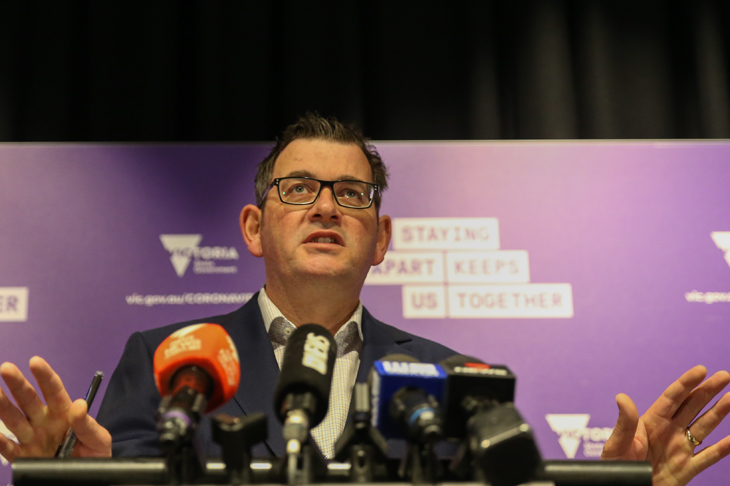For the first time since self-government was granted by the British in the nineteenth century, Australia has become a series of rolling tin-pot dictatorships.
What was truly appalling this year was than not one of the checks and balances we rely on to protect us from any rampant Mussolini class actually worked.
Not one.
Most of the dictatorships were installed by ministerial subordinate legislation.
Like a tsunami, nothing stopped them. Not disallowance by a second chamber, which exists in all states except Queensland. And even where there is a second chamber, the disallowance power has too often been deleted by a compliant chamber.
Nor the courts where the prime minister does not see a sacred duty to maintain the federation and our open borders, where there have been few other plaintiffs who stay, and which anyway did not show the urgency the High Court did when it once rushed to get rid of John Howard’s attempt to block electoral fraud. Some of the viceroys may have expressed their concerns, but too often the making of subordinate legislation has been taken away from and not reported to the executive councils. And rather than a check and balance, much of the mainstream media has preferred to act as the panic adjunct of the relevant premier relaying endlessly the dictatorial mantra to ‘do the right thing’.
Thus, Australian democracy collapsed before a tsunami of power-crazed politicians and their armies of advisers.
And yet we are one of the half-dozen oldest continuing democracies in the world.
The point is that if anyone doubts Lord Acton’s dictum that power tends to corrupt, an objective analysis of the politicians’ response to the Wuhan virus should settle the matter. Decisions were too often taken for political advantage rather than on medical grounds, often exhibiting blatant inconsistencies.
The decision to impose a lockdown which so seriously damaged the lives, businesses liberties and freedom of hundreds of thousands of law-abiding Australians necessitated great care and attention to the question whether it was justified.
But instead, the politicians revealed an incompetence that was breathtaking, suggesting that attention was concentrated on political considerations rather than on the question of absolute necessity.
In place of the requisite judgement Edmund Burke suggested is the only point in choosing a parliamentary representative, Australia’s political leaders substituted flawed and exaggerated modelling. As mentioned before, and which should never be forgotten, this contained a key error so astronomical and so glaring (the projection of a daily need of 35,000 intensive care units) that the humblest tradesman, farmer or small businessperson would have surely questioned it had they been allowed to lay eyes on it
Neither our leaders noticed it, nor did the bureaucratic supremos privy to the modelling.
They want you to forget this outrage. You shouldn’t.
The result was that what in many ways is a trial dictatorship was imposed, and especially in Victoria, the state appropriately in some embryonic relationship with communist China.
The nation, to a greater or lesser degree, was subject to a brutal and wholly unnecessary lockdown. The number who died from the virus was well over 125 times higher than it should have been had the politicians disobeyed Beijing’s wishes and followed Taiwan, home of world’s best pandemic practice.
To recall the corollary of Acton’s dictum about power, a constitutional system must provide checks and balances against the corruptive nature of power.
This experience has become an evil precedent for the politicians and not only about pandemics. Already there are calls to use the concept of dictatorship to impose the imagined cure to global warming, no doubt another way for the communists to undermine the West which among Western leaders President Trump alone has noticed.
Now in determining what should be the question du jour, how to ensure checks and balances always operate to prevent the abuse of power, it is appropriate to recall that the federation of Australia was achieved not by the politicians alone, but by the direct involvement of the people under the Corowa Plan.
This required the direct election of a convention with its conclusions being put directly to the people for decision by referendum. Our ancestors designed a constitution for a country, put it to the people, changed it, put it again, took it to London and put it through the Westminster parliament. All in four years without air travel and the internet. This is a precedent worth following for the first people’s review of the constitution in over 120 years, particularly of course to reinstall protections against the abuse of power.
To do this, some formal changes to the Constitution should be made consistent with the Corowa Plan. As argued here, we should constitutionalise Alan Jones’ Pub Test, that is, ensure that the common sense with which the rank-and-file are liberally endowed, can always prevail.
There are six points which should be encompassed in this approach:
– either House, or three state Parliaments or the people by a petition of, say, 5 per cent of electors nationally and in a majority of states, shall be able to call an elected convention to sit for a maximum of three years.
– each state and territory shall be entitled to elect a number of unpaid delegates equal to one half the total of their senators and MHRs.
– no candidate shall in campaigning be entitled to claim endorsement or affiliation with a registered political party.
– where possible the convention shall operate through committees and with electronic communication.
– after wide consultation, the convention may put a constitutional referendum or referendums.
– Yes and No cases for all voters will be prepared for each referendum question by the appropriate delegates, with federal funding for reasonable advertising expenses.
This of course will only occur if there is an overwhelming demand from Australians to take back their country. The solution is in our hands.
Got something to add? Join the discussion and comment below.
Get 10 issues for just $10
Subscribe to The Spectator Australia today for the next 10 magazine issues, plus full online access, for just $10.
You might disagree with half of it, but you’ll enjoy reading all of it. Try your first month for free, then just $2 a week for the remainder of your first year.














Comments
Don't miss out
Join the conversation with other Spectator Australia readers. Subscribe to leave a comment.
SUBSCRIBEAlready a subscriber? Log in